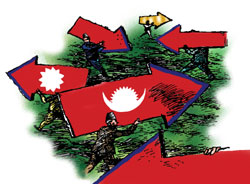 For public consumption, the eight party politicians have said all they can in support of constituent assembly elections. What they aren't discussing is public education.
For public consumption, the eight party politicians have said all they can in support of constituent assembly elections. What they aren't discussing is public education. The coalition partners are not doing much themselves to educate the general public about Nepal\'s first such polls, they are also keeping the election commission from launching voters education program. In large part this is because the parties themselves are not yet clear what kind of elections these will be.
"Since there is no legal clarity on what kind of election procedures would we be following and how the polls be will be held, we are unable to conduct any education program for voters," said chief election commissioner Bhoj Raj Pokhrel. "The problem specifically is that no one knows what kind of procedures we will adopt for proportional electoral system.
Lawmakers agree it's a crucial issue that needs to be resolved and there is discussion in the parliament the constituent assembly member election bill that shall essentially decide on the types of proportional electoral system, one of the two electoral systems mentioned in the interim constitution.
Speaker Subash Nembang says the bill is the most important legislation relating to constituent assembly elections but the parliament should not to be blamed for the delay. "The entry of the bill in the parliament itself was delayed at first place. We have been prodding the government and the election commission to timely table all these important legislations." If politicians and lawmakers are finding it that difficult to even discuss and prepare the electoral legislations, would voters be able to make head or tail of it?
Foreign aid meant to support public awareness on constituent assembly elections has come in, but the funds have not yet reached where they should have. The recently established Nepal Peace Trust Fund, for instance, has received around $4 million dollars as foreign assistance and the money is also meant for educating people about the upcoming elections. But not a single penny has been spent for that purpose.
Rameshwor Khanal, secretary at the Finance Ministry that has a working relation with the Fund, explains why: "No educational works have been started because no date has been fixed for elections. Once the dates are announced, the election commission will go for publicity among people and then the peace fund will provide the necessary fund."
In its recent notice to the government that it cannot hold elections within the next two months, the election commission has listed several reasons and one of them is the time needed to educate voters. Given Nepal's staggering illiteracy rate and the need to educate voters through so many languages and local dialects, it would indeed be an uphill task.
Donor community members say they realise the urgency and have taken whatever initiatives they can, but voter education remains first and foremost the job of the government. "Civic education is one of the things we will look at with other donors to see what we can do to help," said British Assistant Minister for International Development Gareth Thomas. "But obviously this is something which the government has got to lead on."
For public education donors like British, Norwegian and Swiss governments have been coordinating with the UNDP, which too hasn't seen things moving. Its Nepal chief Matthew Kahane said even local leaders and activists in countryside understood quite little about the elections. "When they don't understand much, how can we expect ordinary voters to know?"
Several surveys have revealed voters' ignorance. One done by Kathmandu-based Interdisciplinary Analysts last February showed that although seventy percent of respondents had heard about constituent assembly, only one third of them claimed knowledge (accurate or otherwise) of what it means ("Big questions").
Few politicians are talking about how they expect Nepalis to elect a body that will write a constitution for the future of Nepal. Nepali Congress leader Arjun Narsingh KC admits public education is seriously lacking but he thinks it is not surprising. "At a time when the parties and the government have not been able to do enough to maintain law and order, what can they do about voters education?
No surprise, perhaps, that his party boss and prime minister Girija Prasad Koirala said recently "in abnormal times like this, you will have elections in abnormal ways."
Navin Singh Khadka is a journalist with BBC Nepali Service


